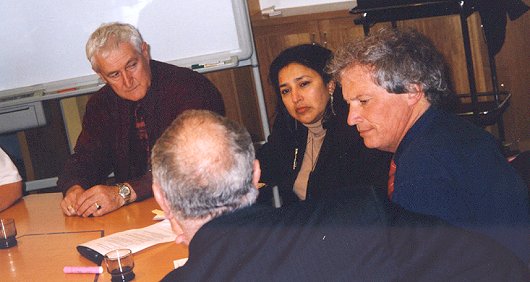- to provide a national focus of leadership on the jobs issue through co-operation between Mayors concerned about employment issues in their communities,
- to share best practice on what we can achieve on employment at the local level,
- to create local and national forums which address the "big picture" of trends on the issues of income and work,
- to link with imaginative private sector initiatives that are addressing unemployment.

Goals and Objectives

Mayors involved in this Taskforce are taking leadership to help our communities achieve the following goals:
|
— that all young people under 25 years be in paid work, in training or education, or in useful activities in our communities.
A Job Guarantee |
The objectives of the MAYORS TASKFORCE for JOBS are:

CHRISTCHURCH MAYOR GARRY MOORE writes:
In February 2000, a core-group of Mayors from throughout New Zealand met in Christchurch to establish a MAYORS TASKFORCE for JOBS which will be a national focus for Mayors concerned about the future of work and livelihood in our communities.
This initial core group included Garry Moore (Christchurch), Derek Fox (Wairoa), Sukhi Turner (Dunedin), Jenny Brash (Porirua), John Chaffey (Hurunui), Tim Shadbolt (Invercargill), and Jill White (Palmerston North)
At the year 2000, New Zealand passed the deadline for many of the goals set in the report of the 1994 Prime Ministerial Taskforce on Employment. The 1994 Taskforce had described unemployment as "New Zealand's greatest challenge" ... and felt that by the year 2000 it was entirely feasible for us to ensure that no-one in New Zealand would be out of work or training for longer than six months.
Yet, at the turn of the Millennium, we find that unemployment is still very much with us, with nearly 200,000 people still jobless in our communities. The core group of Mayors involved in setting up this taskforce decided to renew their public commitment to addressing these issues and pledged to co-operate on future initiatives. .
The Mayors recognised that we needed to act wiser and more effectively on the issues of employment and livelihood, and undertake more long-term thinking in this field. Our communities are based on livelihood, yet we seem to be creating a society which continues to have no need for the work of a large number of people. This Taskforce is affirming that there is no continuing justification for the "waste of New Zealanders" through unemployment. There needs to be an organised sense of leadership about the future of work and livelihood and we must create more opportunities for our children’s children.
The jobs of the future will certainly still come from new business opportunities. However, future employment will also be driven by our collective choices to value the new work that needs to be done. This will require a shift in thinking about what we value and Mayors can play an important governance role in leading these choices on behalf of our communities.
Our role as Mayors in this initiative will be a governance one — taking political leadership on the jobs issue and on the future of income and work in our communities.
Our governance role promotes and sustains the vision of healthy communities where all citizens have the opportunity to participate and where quality of life is continually improved. Our leadership role focuses on being a catalyst through raising local awareness and modelling collaborative working relationships. Our political role raises the profile of these issues and places the state of our local communities on the national stage.
All these roles will involve becoming personally aware of the trends locally, nationally and internationally … and ensuring this information is disseminated widely, and in ways that encourage debate at all levels and across sectors.